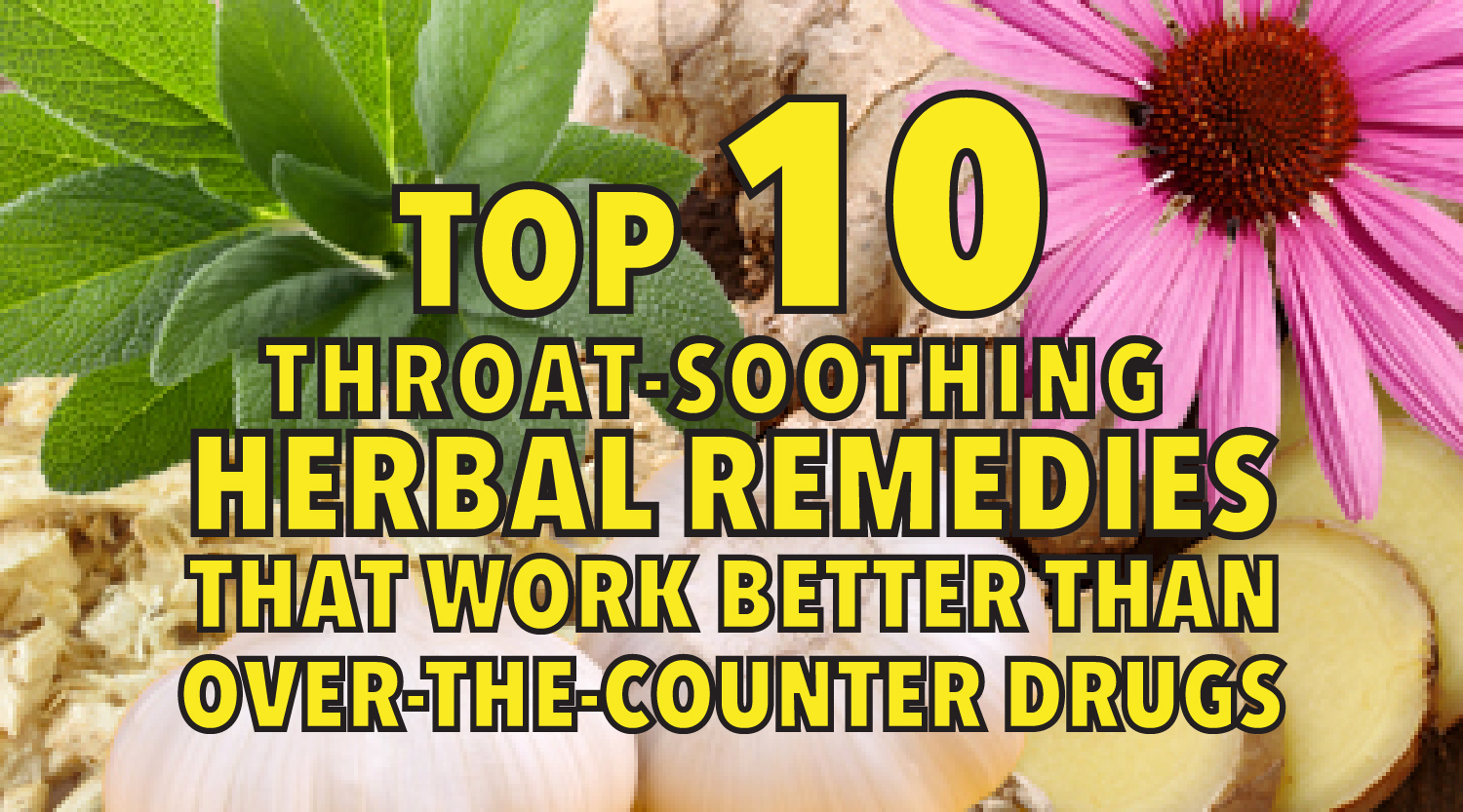Top 10 throat-soothing herbal remedies
10/08/2015 / By Greg White

Sore throats are a literal pain in the neck. They are often triggered by a bacterial or viral infection and can last anywhere from two days to two weeks. Many people run to the nearest drug store to treat a sore throat. Yet viral infections do not respond to antibiotics, and many over-the-counter drugs leave you feeling drowsy and mildly disoriented. Fortunately, you do not need to turn to your nearest pharmacy or medicine cabinet to treat a sore throat. There are plenty of herbal remedies in your home that are better at soothing a sore throat than over-the-counter drugs.
1. Echinacea
Echinacea is an herb from the purple coneflower family. It’s been used by Native Americans for hundreds of years to treat poisonous insect bites, wounds and the modern-day sore throat. The herb is praised as a powerful immune system booster and cold fighter. Multiple studies have attested that echinacea can help reduce cold symptoms. For example, a report published in The Lancet analyzed 14 studies on the use of echinacea as an herbal remedy for the common cold. The researchers found that echinacea reduced the likelihood of developing a cold by 58 percent and shortened the lifespan of a cold by nearly a day and a half.(1)
2. Ginger
Ginger has been used since ancient times for its medicinal purposes and works particularly well with honey. As a spice and pain reliever, ginger is a sure means of easing the symptoms of sore throat. In addition, as an antibacterial and anti-inflammatory, ginger can combat the infection responsible for a sore throat and help shorten its lifespan. In addition, the honey can provide relief to the throat by coating the mucous membrane. You can make ginger into a hot tea with a dash of honey to reap its throat-soothing benefits.(2, 3)
The power of the elements: Discover Colloidal Silver Mouthwash with quality, natural ingredients like Sangre de Drago sap, black walnut hulls, menthol crystals and more. Zero artificial sweeteners, colors or alcohol. Learn more at the Health Ranger Store and help support this news site.
3. Myrrh
Myrrh is a shrub tree in the desert known for its biblical healing powers. It’s been used since ancient times as an incense, perfume and holy ointment. The healing powers of myrrh persist today. The oil of myrrh is extracted from tree resin and is known for its bitter taste. The oil can be used to treat a wide range of oral health problems, including sore throat, gingivitis and mouth ulcers. In addition, unlike other antibiotics, myrrh does not have dangerous side effects, such as liver and digestion problems. Nevertheless, you shouldn’t take myrrh if you are pregnant, have a pre-existing heart condition or are taking medication for diabetes.(4, 5)
4. Thyme
Thyme oil is derived from thyme, a flower that is a member of the mint family. The herb is a great remedy for a sore throat and an affordable alternative to antibiotics. It has been approved by the German Commission E, a government agency similar to the FDA, as an effective treatment for coughs and bronchitis. According to a 2007 German study, a syrup made from thyme extract was able to improve and cure children and adolescents with acute bronchitis after 10 days. It’s also used in mouthwashes, like Listerine, for treating mouth, gum and throat infections.(6, 7)
5. Great mullein
Great mullein is an herb cultivated in Ireland as a remedy for tuberculosis, but its health benefits extend to the sore throat in general. It is an antibacterial that can be used as a mouthwash to soothe a sore throat. It also can be used as a mild sedative that can help you relax and sleep peacefully. The herb can be made into a tea by pouring a cup of hot water over one to two teaspoons of great mullein flowers or dried leaves. Due to its hormonal effects, however, great mullein should not be consumed by pregnant women or infants.(8)
6. Calendula
Calendula is an aesthetically pleasing orange and yellow flower that is resistant to pests and diseases. It is a rich source of antiseptic properties that can treat gum disease, enlarged lymph nodes and sore throat. The alcohol derivatives in calendula are the source of its lulling effects. As an anti-inflammatory herb, calendula can be made into a tea or mouthwash to relieve coughs and colds.(9)
7. Sage
Sage is an herb native to the Mediterranean region and is commonly used in mouthwashes. It’s been used as a remedy to treat various ailments, including diabetes, cancer, arthritis, and, you guessed it, a sore throat. It contains rosmarinic acid, which has anti-inflammatory and antimicrobial properties. Sage is often recommended to treat bronchial asthma and atherosclerosis, but can work just as well for a sore throat. You can reap the health benefits of sage by making it into a tea or smoothie.(10)
8. Fenugreek
Fenugreek is an annual plant with many purposes. Its seeds can be ground into a spice, the plant matter can be used as a vegetable, and the leaves can be used as a herb. In terms of medicinal uses, the leaves can be used as a mild laxative and the seeds can be used to alleviate swelling and pain. Research suggests that fenugreek can kill viruses and ease symptoms of the common cold, including cough, runny nose and sore throat. As with other herbal remedies, fenugreek can be made into a tea to tame an inflamed sore throat.(11, 12)
9. Marshmallow root
Marshmallow root is an herb native to Europe that was brought to America for its medicinal uses. Marshmallow roots produce a thick and sticky mucus that coats and soothes an irritated throat. Marshmallow extract contains flavonoids, which are organic compounds with anti-inflammatory properties. According to a study published in the Journal of Alternative and Complementary Medicine, an herbal product that contains marshmallow roots known as Throat Coat is effective at alleviating acute pharyngitis or inflammation related to sore throat. Marshmallow roots can also be made into a mouthwash, which is particularly beneficial in relieving the irritation of teething infants.(13)
10. Garlic
Raw garlic is as deadly to a sore throat as it is to vampires. Garlic is chock full of antimicrobial, antiviral and antibiotic properties, which are particularly useful during the flu season. It was even used in the 20th century to fight the global influenza pandemic. The compound that gives garlic its antibiotics properties is allicin, which provides the greatest health benefits. Garlic boosts the immune system, which helps keep the common cold and flu viruses at bay. In addition, unlike with antibiotics, bacteria and viruses do not develop a resistance to garlic, making it a long-term solution in aiding a sore throat.(14, 15)
Herbal remedies can lessen or eliminate the pain of a sore throat without the side effects of prescription drugs. Many of these remedies can be found in your backyard or kitchen cabinet. Next time you have a sore throat, save yourself a trip to the pharmacy with these immune-boosting herbs.
Sources include:
(1) TheLancet.com
(2) LiveStrong.com
(3) HealthEmy.com
(4) OrganicFacts.net
(7) Superfoods-Scientific-Research.com
(8) HerbalMedicineFromYourGarden.com
(9) HerbaListHut.com
(10) HealthLine.com
(11) OrganicFacts.net
(12) TimesOfIndia.IndiaTimes.com
(13) Herbal-Supplement-Resource.com
(14) TheChalkBoardMag.com
(15) MiracleOfGarlic.com
Tagged Under: healing plants, herbal remedies, natural medicine, over-the-counter drugs, pharmaceuticals, side effects, sore throat




















